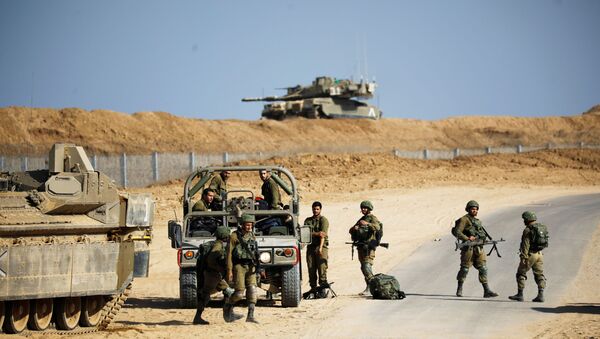Bar-Ilan, a native of Kfar Gaza, a Jewish community located only five kilometers away from the Gaza Strip, remembers well that night of 12 November, when sirens went off and rockets started falling.
On that night, at 4am local time, Israel launched an operation that killed Baha Abu Al Ata, one of the Palestinian Islamic Jihad's (PIJ) top commanders, and the rage of the group was soon to come.
In the days following the attack, PIJ militants launched more than 450 rockets at Israel's towns and cities; 90 percent of them were intercepted by the Iron Dome missile defence system.
That reality was familiar to Bar Ilan, who has seen a number of escalations and who has lived through several wars between Israel and the militants of the Strip.
No End in Sight
But the targeted killing of Abu Al Ata and the face-off that followed shortly after sharpened her feelings of "helplessness and frustration," especially after realising that Israel's government preferred to talk, rather that act.
"Politicians threw around many slogans, including that Israel will deal a blow to anyone who dares to harm the residents of the south. In reality, however, not much has been done. Sometimes the fire towards Israel escalates, sometimes it is mild and barely noticeable but the truth is that is always there," Bar Ilan complained.
The first rockets emanating from the Strip hit Israel in 2001. From then until 2007, the year when Hamas seized control over the enclave, Palestinian militants carried out more than 2,300 missile launches, and that number has only grown with time.
For Bar Ilan and many other residents of Israel's south, that reality is unbearable. Those who fail to cope with the situation prefer to leave the area, relocating to cities and towns far away from the troubled neighbourhood. Others stay, but life in a region where rockets and incendiary balloons dictate daily routine, takes a psychological toll that very few can withstand.
"We live on a ticking time bomb with the realisation that things can change at an instance. Mothers, who stroll with kids, always stay close to shelters, just in case there is a red alarm. Students and young people will never gather at a place that doesn't have a shelter and children that hear jets in the skies often ask whether sirens are set to go off."
Government is to Blame
Just like many residents of the south, Bar Ilan holds Israel's government responsible for the lack of stability in the area and says the state invests money and efforts into defence, not the offence that's often needed to curb the threat of terror.
In 2011, the Jewish state started operating its Iron Dome missile defence system, that has proven to be successful in intercepting rockets emanating from the Strip. In addition, Israel is currently working on a number of projects that aim at tackling the threat of incendiary balloons and is constructing an underground barrier that is set to stop the infiltration of Palestinian terrorists into Israeli territories.
In an attempt to maintain quiet on the border, Israel is also cooperating with Qatar allowing it to provide millions of dollars a month in assistance to the Islamic group.
"These are temporary bandages, not a solution and the problem is that I have never heard of any concrete policy when it comes to Gaza," said Bar Ilan, adding that the only way out of the current dead end is a series of negotiations.
"Such talks will be beneficial for both sides. On the one hand, it will improve the security of Israel's residents, and on the other hand, it will elevate the financial situation of Gazans, who are currently suffering from acute fiscal crisis."




